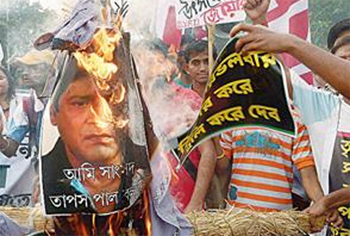Mumbai, Jul 29: CID directed to probe case involving his threats to get women related to CPI(M) members raped.
The Calcutta High Court on Monday has given the police 72 hours to file an FIR against Trinamool Congress MP Tapas Pal for his controversial comments against women and directed that the CID investigate the matter.
 The court was responding to a PIL filed against Pal for his remarks where he had threatened to "send his boys to the homes of CPI (M) members, kill them, and rape their women if any Trinamool member was attacked".
The court was responding to a PIL filed against Pal for his remarks where he had threatened to "send his boys to the homes of CPI (M) members, kill them, and rape their women if any Trinamool member was attacked".
Justice Dipankar Dutta directed that the high court would monitor the probe in view of West Bengal government's stand that the complaint did not disclose any cognisable offence and that the state tried to back the MP.
The court had seen video footage of the incident during last week's hearing.
In addition to his rape remarks, Pal was caught saying he carried a gun in his pocket. "I will personally shoot CPI (M) supporters with a revolver," he was caught saying. Justice Dutta directed the CID authorities to file a status report on progress of investigation on September one.
Justice Dutta, who had admonished the state on previous occasions also, quoted Martin Luther King Junior saying "injustice anywhere is a threat to justice everywhere."
Pal had in an open letter tendered unconditional apology to the media and the public at-large for his unsavoury comments.





Comments
Add new comment